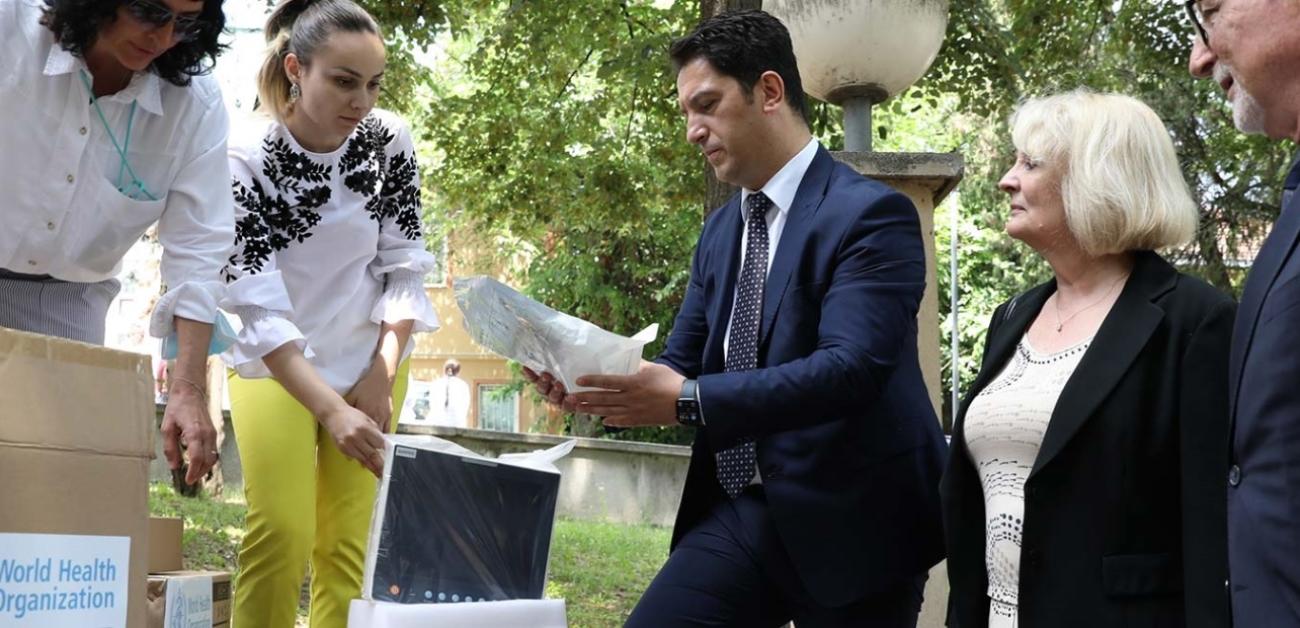Biomedical equipment provided by WHO and USAID helps COVID-19 patients in North Macedonia

4 July 2022
WHO and the United States Agency for International Development (USAID) delivered patient monitors, oxygen masks and bilevel positive airway pressure (BiPAP) machines – which allow health-care workers to get oxygen into the lungs of a patient – to the Ministry of Health to assist North Macedonia’s COVID-19 response. The biomedical equipment, worth 6 244 000 Macedonian denar (MKD) (roughly 100 000 euro), will help health-care workers in COVID-19 centres to provide better treatment and life-saving care for patients.
Patient monitors are essential tools for treatment and care of patients with respiratory illnesses and in need of intensive care. They provide information on vital signs including heart rate, blood pressure, oxygen saturation and other respiratory parameters, which is used by medical and nursing staff to better manage the treatment of patients with severe COVID-19 symptoms. Oxygen masks and BiPAP machines help save lives by providing timely and appropriate oxygen therapy support to patients affected by COVID-19.
“I would like to thank WHO and USAID for this truly valuable contribution to our health-care system. This is going to strengthen our response to COVID-19, particularly the care of patients with severe COVID-19. I would like to remind everyone that the pandemic is far from over and that our health-care system must remain prepared and equipped to save lives,” said Dr Bekim Sali, North Macedonia’s Minister of Health.
Future, long-term needs addressed
“The COVID-19 pandemic is not over, but this pandemic has forced us globally to recognize the gaps in health-care systems for responding to such a public health crisis. The medical equipment we are delivering today will address some of those gaps, not only for treating COVID-19 patients, but for others in need of intensive care and extensive monitoring, particularly for respiratory illnesses,” said James Stein, Acting USAID North Macedonia Country Representative.
Dr Anne Johansen, WHO Special Representative to North Macedonia and ad interim Head of Country Office added that “by mitigating the shortage of medical equipment in the designated COVID-19 centres, not only we are supporting the health-care workers at critical times, but also the preparedness of the health-care system in meeting future, long-term needs”.
In addition to this donation, WHO and USAID have in the past 2 months provided an additional 836 908 MKD worth of information technology (IT) equipment to upgrade the information/communication infrastructure of the national Public Health Emergency Operations Centre and the 10 regional centres. Similarly, 932 530 MKD of IT equipment was provided to the Institute for Public Health and the 10 regional public health centres to support the pandemic response.
As well as providing biomedical and IT equipment and COVID-19 testing reagents and supplies, WHO is contributing to national efforts by partnering with USAID on a number of other initiatives. These include building North Macedonia’s health system emergency preparedness and response capacities during the COVID-19 pandemic; developing a Public Health Emergency Operations Centre and intelligence network with the regional public health centres across the country; supporting capacity-building of the health workforce in terms of preparedness and response; and fighting dis- and misinformation to increase trust in the COVID-19 vaccination process.

